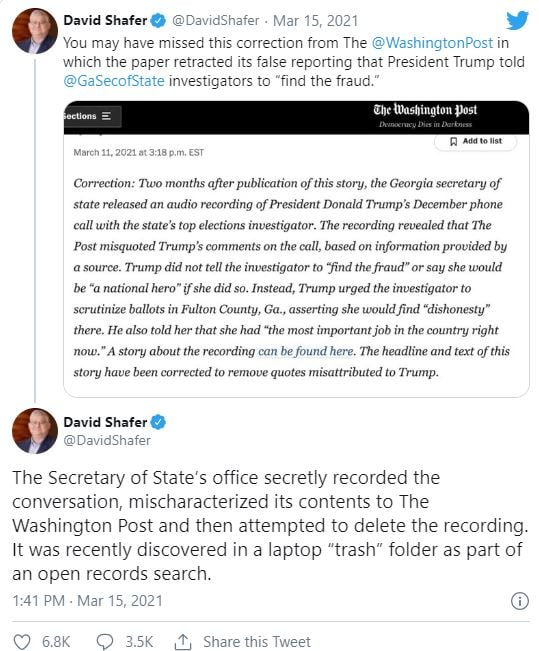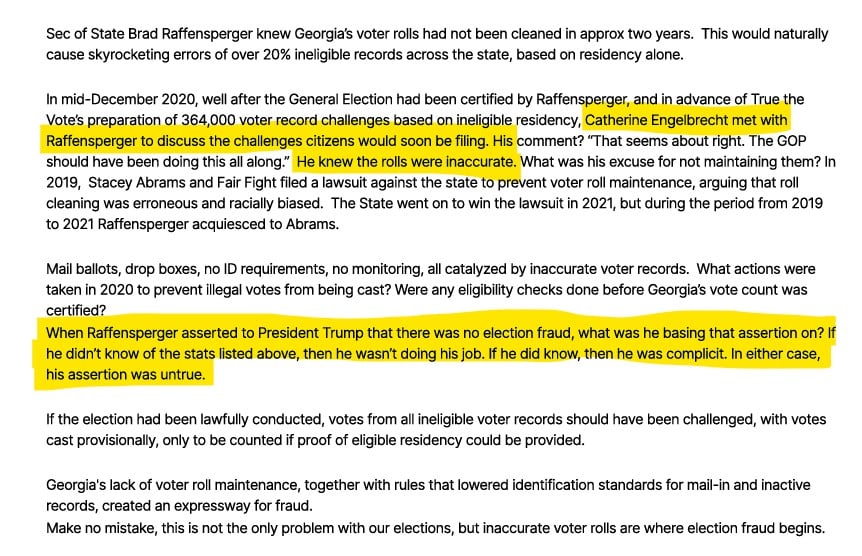Fulton County: Massive Last-Minute Order of over 1M Ballots Discovered
- by: Kevin Moncla
- 2021-10-25
- Source: UncoverDC
Link:
https://uncoverdc.com/2021/10/25/fu...t-minute-order-of-over-1m-ballots-discovered/
Fulton County: Massive Last-Minute Order of over 1M Ballots Discovered
FULTON COUNTY, GA—Ever since the 2020 general election, there have been countless details, facts and records uncovered which suggest that whatever happened on November 3rd was not acceptable. As the “non-existent” evidence of nefarious election manipulation mounts in swing states, the surprises coming from Georgia are unbelievable, and the scope of election “mismanagement” is shocking. Each situation is far worse than what we would have ever thought possible.
Recently,
UncoverDC reported that Fulton County paid Dominion nearly $2,000,000 to essentially staff and run their voting systems for the 2020 general election. The reason for this was because much of the County election staff was quarantined, presumably due to contact with someone who tested positive for COVID-19.
While investigating election-related invoices for the article mentioned above, other expenses raised suspicion. One of the funding lines showed a payment to Runbeck Election Services for $223,360.90. (Readers are likely familiar with Runbeck as the company that printed and mailed the ballots for
Maricopa County, AZ.). An Open Records Request for Runbeck initially returned “No Responsive Records”:
It wasn’t until another request was made detailing the amount and specific number of the purchase order that Fulton County finally produced the following document:
While the invoice seems innocuous and innocent, (a county simply ordered the printing of ballots for an election) context and timing reveal that there is much more to this than meets the eye.
It’s important to understand that Georgia has two types of voting and two types of ballots. First, is “in-person” voting which takes place on Dominion voting machines (called Ballot Marking Devices or “BMD’s”) that print the entire ballot and voter’s selections on blank 8 ½ X 11” Vote-secure paper (Left below). Second, is Absentee/By-Mail voting which is on a much larger, 18” long printed ballot (Right below). The quote above is for the latter, 18” ballots.
Fulton County, along with nearly every other county in Georgia, participated in a program through the Georgia Secretary of State’s office in which ballots were printed and mailed directly to the voter. The document below describes the program:
Here’s how it worked: voters would request an Absentee by Mail Ballot by filling out a form and mailing it to the county, or doing the same thing online through the county/Georgia Secretary of State website. The information would then be submitted to the printing company who would print the ballot and mail it directly to the voter.
The program received its final ballot orders on October 16, 2020. Then, counties had to facilitate the printing and mailing of only a small number of ballots requested from October 17 until the cut-off date at the end of the month.
The Runbeck ballot order was in addition to, and separate from, the Secretary of State’s ballot printing and mailing program. The massive 17-pallet order of 770,210 Absentee by Mail ballots was delivered to the county on October 24, 2020.
There’s more. Attempting to gain a thorough understanding and through a persistent series of Open Records Requests, we received the following Invoice from Fulton County.
It is important to note that the order from Fidlar for an additional 288,700 ballots was shipped on October 20, 2020. Based upon the date shipped, the order was presumably made around the same time as the Runbeck order.
Combined, the two orders total a whopping 1,058,210 ballots!
The images below, taken shortly after the election, are from the
Fulton County warehouse and only show a small fraction of the actual ballots ordered. The pictures have been circulating on the internet for some time, but the details and context surrounding the ballots were not fully understood.
[gallery type="slideshow" size="full" td_select_gallery_slide="slide" ids="32125,32124,32122"]
With just 10 days until the November 3rd election, there was literally no way to sort, prepare, fold, stuff and mail out the ballots before the election. Especially considering there were no envelopes ordered. This fact alone removes any possibility that they intended to mail the ballots.
After sharing the Runbeck ballot order quote with others in search of answers, one of them posted it on Twitter, to which
Gabriel Sterling responded:
Mr. Sterling’s explanation for the order sounds logical and plausible. Because of a problem that was discovered with the Dominion software, an update had to be installed on each of the thousands of voting machines across the state. Due to the resulting delay, there simply wasn’t enough time to perform the proper (and legally required) Logic and Accuracy Testing. Although COVID-19 may have exacerbated the problem, the core issue that caused the delay was a Dominion software failure.
A voter integrity group called Coalition for Good Governance who had been in a long-running court battle against the use of the voting machines and the Secretary of State brought the matter before the court. Because the voting machines had not been properly tested, the court could have prohibited them from being used for the election, thereby creating a situation in which voters would have had to hand-mark the absentee ballots.
It is this potential scenario for which Sterling claimed was the reason for the ballot order; however, a closer look at the record proves otherwise.
First, the issue of Logic and Accuracy Testing he claims precipitated the ballot order had already been settled by a court decision on Sunday, October 11, 2020. Judge Amy Totenberg found that the voting machines had not been tested in accordance with Georgia law but decided that the court was not prepared to prevent the voting machines from being used and deferred to the Secretary of State about the testing. Specifically, her
decision stated:
“
Recognizing that early voting starts on October 12, 2020 and the imminence of the November 3, 2020 general election, the Court must defer to the Secretary of State's Office and State Board of Elections determination of whether additional measures are pragmatically feasible at this juncture to strengthen the scope of L & A preparations for a general election with a huge anticipated turnout. As L & A testing has already commenced on BMD equipment to be deployed at early voting locations, the Court is not prepared to issue a ruling on the L & A testing issue purely standing on its own.”
Following the ruling of the court, early voting began the very next day using the BMD voting machines Gabriel Sterling claimed were at issue. The fact is they weren’t. The matter of Logic and Accuracy Testing was decided by the court on Sunday, BMD voting machines were used by early voters on Monday and the ballots weren’t ordered until days later—on Friday.
In other words, at the time of the orders, Fulton County was already well aware that any questions surrounding the use of the machines had already been settled because they were already in use!
Sterling’s explanation doesn’t pass the smell test for a second and separate reason. According to the Secretary of State’s website, Fulton County’s total number of ALL votes cast in the general election (including absentee, early and election day voting) was 528,777. One week before the ballot order, on October 8th, Fulton County Elections Director, Rick Barron, reported to the Fulton County Board of Elections that 183,915 ballots had already been mailed to Fulton County voters. Therefore, even if the court had ruled against the Secretary of State and prohibited the machines from being used, Fulton County would have only needed little more than a third of the 1,058,210 ballots to accommodate every single voter.
The third strike for Sterling is that no other Georgia Counties ordered significant numbers of extra ballots. In fact, Cobb County and Gwinnett County both confirmed that they only ordered the legally required number of “Emergency Ballots” (10% of active, registered voters in their county) to have on-hand for election day. This is relevant because the legal/court issue Sterling presents as the reason for the Fulton County ballot order would not have just affected Fulton County but the entire state of Georgia.
The three reasons presented above remove any logic and all credibility from Gabriel Sterling’s assertions regarding the last-minute ballot order.
The fact is, we still don’t have a clear understanding or justifiable reason for why Fulton County would order so many ballots. Consider the fact that with the massive number of absentee ballots ordered and received, one could have replaced nearly all 1.1 million absentee ballots cast in the entire state of Georgia (hint, hint).
More to come soon.
















